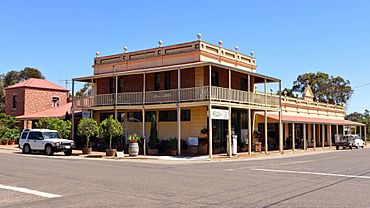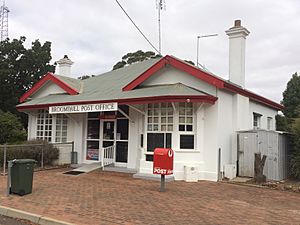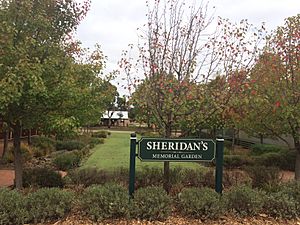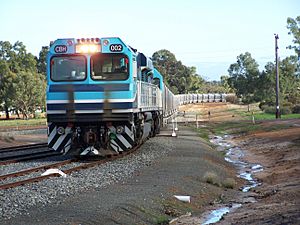Broomehill, Western Australia facts for kids
Quick facts for kids BroomehillWestern Australia |
|
|---|---|

The Henry Jones Building, Broomehill, 2018
|
|
| Established | 1890 |
| Postcode(s) | 6318 |
| Elevation | 332 m (1,089 ft) |
| Area | [convert: needs a number] |
| Location | |
| LGA(s) | Shire of Broomehill-Tambellup |
| State electorate(s) | Roe |
| Federal Division(s) | O'Connor |
Broomehill is a small town in Western Australia. It is located on the Great Southern Highway. This highway connects the towns of Katanning and Albany. Broomehill is part of the Great Southern region. The local government area is called the Shire of Broomehill-Tambellup. The town is officially known as Broomehill Village. This helps to avoid confusion with nearby areas like Broomehill East and Broomehill West.
Contents
Discovering Broomehill's Past
How Broomehill Began
The town of Broomehill started because of the Great Southern Railway. This important railway line was finished in 1889. It connected the towns of Beverley and Albany. Broomehill was named after Sir Frederick Napier Broome. He was the Governor of Western Australia at that time.
Early Discoveries and Buildings
In 1889, something exciting happened near Broomehill. A station master found quartz that contained gold! This discovery brought attention to the area.
Soon after, a man named Patrick Garrity bought land in the town. He built a hotel made of galvanised iron. By 1905, this hotel was rebuilt with bricks. More parts were added in 1908. It was first called the Broomehill Hotel. Later, it became known as the Imperial Hotel. This two-storey building is now listed as a heritage site.
Growing the Town
The Western Australian Land Company officially marked out the town in 1890. The state government recognised it in 1897. Some settlers from a nearby, now-gone town called Eticup moved to Broomehill. They helped to build up the new town after the railway was finished. Families like the Withams, Walshes, and Curnows worked hard to create the first buildings.
In 1891, a branch of the Commercial Bank of Australia opened in Broomehill. The town also got a police station and a post office in 1892. By 1898, the Broomehill Agricultural Hall was opened. This hall was important for local farmers and the community. In 1898, the town had 72 people living there.
Community Life and Changes
A local group called the Progress Association was formed in 1905. This group helped to improve the town. The Broomehill Football Club was also started around 1907. They played games against teams from nearby towns like Katanning.
In the 1930s, a farmer named Emile Genoni experimented with special farming methods. These methods are now known as biodynamic agriculture. His farm, 'Etna', was one of the first in Australia to try these new ideas. In 1959, the official spelling of the town's name changed. It went from "Broome Hill" (two words) to "Broomehill" (one word).
Broomehill's Economy
The main industry in Broomehill is wheat farming. The town has a Cooperative Bulk Handling site. This is where farmers bring their wheat to be stored and transported. There is also some sheep farming in the area. More recently, farmers have started growing grapes for viticulture (wine-making). They have also begun aquaculture, which is farming fish like barramundi.
Exploring Broomehill's Features
Broomehill is the starting point of the Holland Track. This is a famous 700-kilometre (435-mile) track. It is popular for walking and 4WD adventures. The track goes through the bush to the goldfields at Coolgardie. It was created in 1893 by a pioneer named John Holland.
Images for kids
 | Laphonza Butler |
 | Daisy Bates |
 | Elizabeth Piper Ensley |









